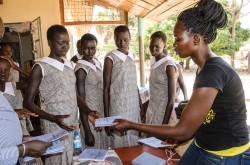Cinema | April 23rd, 2015
 On Saturday, April 25, the public is invited to attend either of two free screenings of “The Good Lie,” starring Reese Witherspoon, at the Fargo Theatre. The screenings will be held at 1 p.m. and again at 7 p.m. and will be followed by Q&As with co-star Kuoth Wiel and others.
On Saturday, April 25, the public is invited to attend either of two free screenings of “The Good Lie,” starring Reese Witherspoon, at the Fargo Theatre. The screenings will be held at 1 p.m. and again at 7 p.m. and will be followed by Q&As with co-star Kuoth Wiel and others.
In addition, local organization African Soul American Heart will feature other events that day that include opportunities to meet actress Kuoth Wiel, ASAH Ugandan director Aja Galuak, and others.
Visit www.ASAHinSudan.org for more information and to find out how you can help.
HPR film editor Greg Carlson talked to ASAH president and founder Deb Dawson.
HPR: What is African Soul American Heart?
Deb Dawson: African Soul, American Heart (ASAH) is a Fargo-based 501(c)(3) nonprofit corporation with a mission to protect, educate, and empower orphaned girls from South Sudan. In 2007, Kevin Brooks and I traveled to Kenya and southern Sudan to make a documentary with Joseph Akol Makeer, a Lost Boy of Sudan, about his desire to help orphans in Duk Payuel, Jonglei State, the village he escaped in 1987.
ASAH began by supporting orphans from Kakuma Refugee camp in Kenya in boarding school. In 2010, I returned to Duk Payuel and met with community leaders who designated land to build a boarding school. We started an after-school program in 2011, and the school opened in 2012.
HPR: What did you do when you found out the school was threatened by the conflict in South Sudan?
DD: By June of 2013, ASAH served 34 orphaned girls from six villages in Duk County. In February of 2014, a conflict between presidential guards spread throughout Jonglei State and resulted in evacuation of most of Duk County.
Our students, who were home with their extended families, fled, running and walking for three or more days without food or clean water. Over the next few months, the ASAH staff found and transported the girls across the southern border to Moyo, Uganda where we rented a facility to house them and enrolled them in local schools.
HPR: The commitment to the students means coming up with inventive ways to deal with the geographical displacement. Are the students all together now?
DD: We are consolidating our operations in Uganda, where we have a safe location, local access to food and other supplies, quality schools for our students, and a dedicated staff. We were able to retrieve two students in November who were in rebel-held territory, but there are still two students we haven’t been able to reach.
HPR: How often are you able to travel to Africa?
DD: I will make my 13th trip to Africa in June. On my most recent trip in January, we added seven new students, some of them newly orphaned by the current war.
Thirty-eight girls hug me when I arrive, and they call me mommy, which feels amazing. I have a passel of grown kids myself – biological, step, and adopted – and I understand how losing parents affects children. I also know that educating today’s young girls is the key to a better future for them and their country.
HPR: How did the Fargo screening of “The Good Lie” come about?
DD: “The Good Lie” was released nationwide in October, but it wasn’t picked up in Fargo. Since Fargo has a large Sudanese population, our VP Kevin Brooks worked with the Fargo Theatre, the filmmakers, and actress Kuoth Wiel to bring the film and the actress here. I’d encourage HPR readers to attend - Fargo is mentioned in the film!
HPR: Compared to non-fiction, can you describe some of the ways that dramatizations of the recent history of Sudan succeed?
DD: The non-fiction documentary films about the Lost Boys have done a great job of narrating their experiences escaping the war and following their awkward adjustment as refugees adjusting to life in the United States, but there is little or no actual footage of their lives prior to the cruel civil war that caused their exodus.
“The Good Lie” brings that part of the story to life, and because the film follows a group of siblings through this experience and then to America, it offers a dramatic narrative resolution.
HPR: What are the next steps for ASAH?
DD: ASAH came full circle in January when we hired Joseph Akol Makeer’s sister, Aja Galuak, as our Executive Director for the Uganda program. She is a graduate of Fargo South and an NDSU graduate in sciences and pharmacy.
Our students now have an educated South Sudanese woman as their role model, a woman who speaks fluent English and Dinka, is compassionate but firm, creative in her thinking, and thrilled to be giving back to her people.
February 16th 2026
February 16th 2026
February 9th 2026
February 4th 2026
January 26th 2026


__293px-wide.jpg)
_(1)__293px-wide.jpg)

__293px-wide.png)